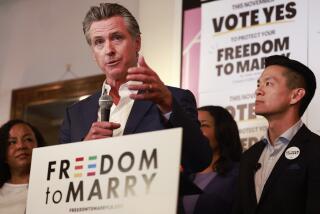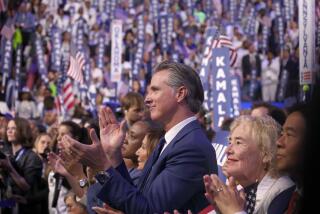‘98 Elections Are Already Inspiring Guesses, Rumors : Politics: Governorship, Senate seat will be up for grabs. Some foresee a Feinstein-Huffington fight for top state job.
Clint Eastwood for governor in 1998? Think of the tough-guy cliches and film clips that could be invoked in a statewide campaign by Dirty Harry, the onetime mayor of Carmel. Alas, an Eastwood aide said this past week that there’s no chance of it happening.
“Absolutely not,” the assistant said in emphatic response to queries about a published report that Republican friends of Eastwood were exploring the possibility of his candidacy for governor or the U.S. Senate in 1998.
It was a fun rumor while it lasted, since first appearing in a mid-August national political column by Robert Novak. Eastwood himself was not available for comment.
“It would make my day,” joked state Republican Chairman John Herrington, who had said he had “indirect” knowledge of a potential Eastwood candidacy.
But Herrington hastily added that “I’m a great fan” of GOP state Atty. Gen. Dan Lungren, who already has launched his unofficial campaign to succeed Republican Pete Wilson as governor.
And a virtually sure bet to run on the Democratic side, barring unforeseen developments, is Lt. Gov. Gray Davis, who has been in state government since going to work as former Gov. Edmund G. (Jerry) Brown Jr.’s first chief of staff in 1975. Already nipping at Davis’ heels is Democrat Kathleen Connell, who succeeded Davis in the state controller’s office last January.
But consider this possibility: A titanic 1998 struggle for California governor between Democratic U.S. Sen. Dianne Feinstein and former Republican Rep. Mike Huffington--a rerun of their mega-bucks mega-battle for the Senate just last year. This could be the political grudge match of the century.
Feinstein representatives say she has no such plans, but wise pols rarely ever rule anything out three years in advance.
But wait a minute. Why talk about 1998 at all? This is only 1995. There is another election next year. How can the 1998 political pot be simmering this early?
For several reasons. One is the term-limit initiative approved by voters in 1990. It restricts all statewide elected officials to two four-year terms in office. Republican Gov. Pete Wilson is the first governor barred by law from seeking a third term.
And just as nature abhors a vacuum, so does politics. The certainty of an open seat in 1998--with no one running with the presumed advantage of an incumbent--draws candidates like moths to a flame.
Secondly, speculation about potential candidates, particularly “fresh faces” or Hollywood personalities, is a popular pre-campaign parlor game among political junkies.
Finally, as veteran Democratic consultant Darry Sragow phrased it: “Insiders can’t talk about nothing. So they’ll talk about ’98.”
Right now, there’s a lot of talk about Feinstein.
Feinstein, 62, has run two exhausting Senate campaigns in the past three years, winning a six-year term in 1994. She has done nothing to encourage talk about a possible run for Sacramento in 1998, and her staff says, “She’s not made any comment about it in any way, shape or form.”
But California political insiders of both parties seem convinced that Feinstein really wants to be governor--especially now that she has been relegated by the big GOP victory in 1994 to working on the minority side of the Senate aisle. Her first statewide campaign, after serving as mayor of San Francisco, was for governor in 1990, when she narrowly lost to Wilson.
One source said Sacramento might look even better to Feinstein if Democrats lose the White House in 1996, therefore relinquishing even the power to veto unwanted GOP legislation, to fill federal executive positions and to control the foreign relations agenda.
As for Huffington, the 48-year-old former one-term congressman from Santa Barbara has set out to mend political fences by touring California and speaking to GOP gatherings wherever he can find them. Huffington says he is considering a possible campaign in 1998 for senator or governor but has indicated he’s more inclined toward governor.
One feature of the political speculation game is that there are virtually no rules. But there is one relatively constant factor: As was the case with this article, the sources generally decline to be named.
This may be because they are uncertain of the accuracy of the information they are passing along, or that it could be embarrassing to one of their bosses or clients if their names were linked with the rumors.
Sometimes, the rumors originate as trial balloons on behalf of potential candidates. The idea is to float a name to see what kind of response it draws from within the California political community, notably from fund-raisers.
Ever since former hoofer George Murphy was elected to the Senate in 1964 and Ronald Reagan as governor in 1966, speculators have loved to test the names of politically active entertainment figures. Never mind that those stars may never have had any intention of seeking office.
One built-in advantage of a Hollywood personality is that he or she comes with high name identification. Making a candidate’s name familiar to voters is the major first step for a candidate, especially a relative unknown scrambling up the ladder. Sometimes, it is the most difficult step.
Here’s an example of how one such rumor got started and resurfaced year after year even though the actor, Gregory Peck, never did anything to encourage it:
After Edmund G. (Pat) Brown was defeated for a third term as governor by Reagan in 1966, the lame-duck Democrat was asked how his party should respond to such a political phenomenon.
“Maybe we should run Gregory Peck,” Brown quipped. It was a jocular throwaway line. There was no indication that Brown had any idea whether Peck might be interested in doing so.
In fact, Peck never did seek office, although his son once ran for Congress in Los Angeles and lost.
The Eastwood story appeared to originate Aug. 13 with Washington columnist Novak, who wrote that “Eastwood is interested in a possible run for public office” in 1998, when both the governorship and a Senate seat are at stake. Friends of Eastwood were studying the manner in which Reagan had made the leap from Hollywood to politics, the column said.
The item then got picked up by the Hotline, a national electronic newsletter on politics. It subsequently made its way into a California political newsletter--never with any response from Eastwood or a spokesman for the actor.
The fact that Eastwood was elected mayor of the village of Carmel with 72% of the vote in 1986 and served two years in that post tended to lend credibility to the report. He not only was a famous name with the potential for a stratospheric favorability rating, but he even had served in public office.
Others who have been mentioned in the past but who have never given any sign of running include Arnold Schwarzenegger, a Republican who happens to have married into the Democratic Kennedy clan, and longtime GOP stalwart Charlton Heston.
For many of the same reasons, sports stars often figure in political speculation, as do business leaders. The sports figures rarely wind up running. Business executive Peter Ueberroth, the wizard CEO of the 1984 Olympic Games in Los Angeles, often has been promoted as an ideal Republican candidate for governor or senator but has never quite made the leap into the world of pure politics.
As for 1996, there is an election scheduled, of course: for President, the state Legislature and seats in the House of Representatives. But that is considered an “off” year for California because neither the governorship nor a Senate seat is at stake.
The big prize of California politics--the governorship--will be up in 1998 with no incumbent running. And Wilson’s decision to campaign for President raised the possibility of a change in the governorship as early as January, 1997.
If the governor were to win the presidency or go to Washington as someone else’s vice president, Democrat Davis automatically would become governor for the balance of Wilson’s term. That would shake up--and accelerate--the dynamics of the contest.
Davis, 52, would have a chance to prove himself in office for nearly two years before facing the electorate.
Lungren has said the chance of Davis succeeding to the governorship prompted him to begin organizing his campaign sooner than he ordinarily would. He recently sent out a fund-raising appeal that said: “It looks like my most likely opponent from the Democratic Party will be Lt. Gov. Gray Davis.”
Lungren added that Davis already had $500,000 on hand for a potential contest for governor and that Lungren needed to begin fueling his own treasury. Wilson and Democratic nominee Kathleen Brown raised and spent about $20 million each in the 1994 campaign that Wilson won by about 15% of the vote.
Others mentioned as potential Democratic candidates for governor include Deputy U.S. Secretary of the Interior John Garamendi, the former state senator and insurance commissioner who ran in 1994 and lost in the primary to Brown, and state Controller Kathleen Connell, 48. Connell is a relative newcomer to statewide politics but already has taken some sharp potshots at the way Davis ran the controller’s office during his two-term tenure.
State Supt. of Public Instruction Delaine Eastin, a Democrat serving in a technically nonpartisan post, is another Democrat with potential for seeking higher office, party experts say.
Out of the spotlight for now is former state Treasurer Kathleen Brown, the 1994 Democratic nominee for governor, now an executive at Bank of America. There has been no indication that Brown, who will be 50 on Sept. 25, would seek the governorship again in 1998, but she has not said anything publicly that would preclude a possible future run for office.
Following the 1994 election, Republicans now outnumber Democrats in their hold on statewide elected offices other than governor. This is a traditional grooming ground for gubernatorial candidates. Potential GOP stars include Treasurer Matt Fong, Secretary of State Bill Jones and Insurance Commissioner Charles Quackenbush.
Also mentioned by some as a potential gubernatorial candidate is Los Angeles Mayor Richard Riordan, but he first faces a reelection campaign in 1997.
Technically, none of the potential candidates is formally committing himself or herself at this point. Too much can happen to change the political landscape between now and early 1998, when they have to make legal declarations to get their names on the June primary ballot.
But consultant Sragow emphasized the need for long-term preparation by saying: “The candidate who wakes up a year out and says, ‘I think I’m going to run for governor or senator,’ is absurd.”
More to Read
Get the L.A. Times Politics newsletter
Deeply reported insights into legislation, politics and policy from Sacramento, Washington and beyond. In your inbox three times per week.
You may occasionally receive promotional content from the Los Angeles Times.










